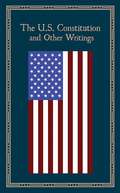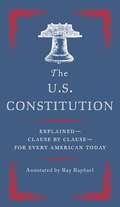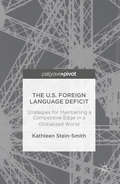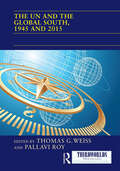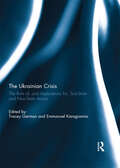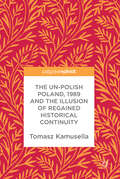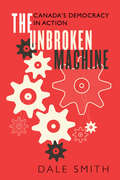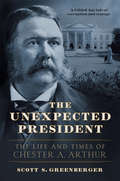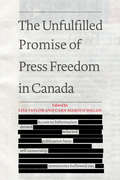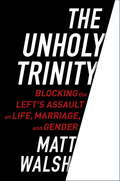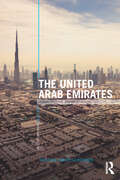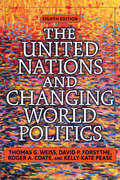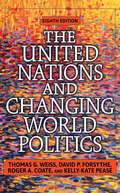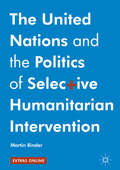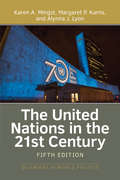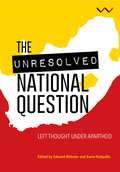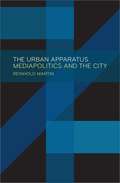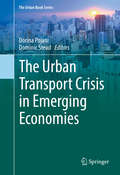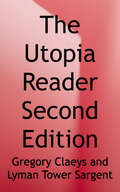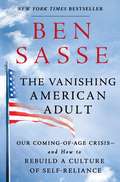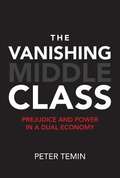- Table View
- List View
The U.S. Constitution and Other Writings (Leather-bound Classics)
by Editors of Thunder Bay Press Kenneth C. Mondschein“We the People of the United States, in order to form a more perfect union . . . ” — The U.S ConstitutionThe U.S. Constitution and Other Writings is part of the Leather-bound Classics series and is a collection of the crucial documents, speeches, and other writings that shaped the United States. In addition to the Constitution, readers can review the Declaration of Independence, the Articles of Confederation, the Federalist Papers, important presidential speeches, and many others. Both famous and lesser-known, but equally important, Americans are represented, including Benjamin Franklin, Victoria Woodhull, Frederick Douglass, Susan B. Anthony, and even the creators of the rules of baseball. The founders' inspirational and revolutionary ideals are all here, and this is a perfect volume for anyone who finds the history of America to be a fascinating and enlightening journey.
The U.S. Constitution: Explained for Every American
by Ray RaphaelPoliticians come and go, but the Constitution stands as the supreme law of the land. Setting forth the workings of our democracy, it is the bedrock document from which we derive our policies on topics as diverse and galvanizing as immigration, gun ownership, voting rights, taxation, policing, civil liberties, and war. In this indispensable edition, acclaimed historian and Constitutional expert Ray Raphael guides us through the origins, impact, and current relevance of the original text and all twenty-seven amendments. Here is the key historical context for issues in the news today—from the Electoral College to Washington gridlock, from peaceful protests to executive power. Thoughtful and nuanced, lively and highly readable, this annotated Constitution is for all of us to read and refer to—the ultimate political fact-checking source for every American.
The U.S. Foreign Language Deficit
by Kathleen Stein-SmithThis volume explores why Americans are among the least likely in the world to speak another language and how this U. S. foreign language deficit negatively impacts national and economic security, business and career prospects. Stein-Smith exposes how individuals are disadvantaged through their inability to effectively navigate the global workplace and multicultural communities, how their career options are limited by the foreign language deficit, and even how their ability to enjoy travel abroad and cultural pursuits is diminished. Through exploring the impact of the U. S. foreign language deficit, the author speaks to the stakeholders and partners in the campaign for foreign languages, offering guidance on what can and should be done to address it. She examines the next steps needed to develop specific career pathways that will meet the current and future needs of government, business, and industry, and empower foreign language learners through curriculum and career preparation.
The UN and the Global South, 1945 and 2015 (ISSN)
by Thomas G. Weiss Pallavi RoyThere is a woeful neglect of the current United Nations in the academic and policy literatures, and so it is unsurprising that an examination of that multilateral structure before 1945 shows an even more egregious absence of analytical attention. Such ignorance conveniently ignores the forgotten genius of 1942–1945, namely in the wide substantive and geographic relevance of multilateralism during the World War II and in the foundations for the contemporary world order. The wartime and immediate post-war United Nations was not simply dictated by the US State Department, Whitehall, and the foreign ministries of the West—even a generation before decolonisation had proceeded apace and two-thirds of UN member states moved into the limelight as erstwhile colonies. These essays interrogate the extent to which anti-colonialists and other nationalists resisting imperial rule embraced the promise of a rule-based world order as a normatively and operationally valuable projection in 1945. They critically review the worlds of 1945 and 2015, of then and now, to determine the role of continuity and change, of the continuing bases for compromise and for the clashes between the Global South and North. This book was previously published as a special issue of Third World Quarterly.
The Ukrainian Crisis: The Role of, and Implications for, Sub-State and Non-State Actors
by Tracey German and Emmanuel KaragiannisThe conflict in eastern Ukraine continues with little sign of a negotiated resolution. Crimea has been absorbed into the Russian Federation, and celebrates the third anniversary of its ‘integration’ in March 2017. The ongoing nature of the conflict contrasts with a lack of academic exploration of the issues surrounding it. To date, most analyses have focused on the geopolitical implications of the Ukrainian crisis, such as the impact on NATO-Russia relations, and foreign policy responses to the crisis from a variety of state and supranational actors including the EU and Russia. The role of sub-state and non-state actors, and implications for them, has been largely overlooked.This volume seeks to rectify this by examining a wide array of non-state and sub-state actors that have both played a role in the conflict in Ukraine and been indirectly impacted by it.
The Un-Polish Poland, 1989 and the Illusion of Regained Historical Continuity
by Tomasz KamusellaThis book discusses historical continuities and discontinuities between the Polish-Lithuanian Commonwealth, interwar Poland, the Polish People's Republic, and contemporary Poland. The year 1989 is seen as a clear point-break that allowed the Poles and their country to regain a 'natural historical continuity' with the 'Second Republic,' as interwar Poland is commonly referred to in the current Polish national master narrative. In this pattern of thinking about the past, Poland-Lithuania (nowadays roughly coterminous with Belarus, Latvia, Lithuania, Poland, Russia's Kaliningrad Region and Ukraine) is seen as the 'First Republic. ' However, in spite of this 'politics of memory' (Geschichtspolitik) - regarding its borders, institutions, law, language, or ethnic and social makeup - present-day Poland, in reality, is the direct successor to and the continuation of communist Poland. Ironically, today's Poland is very different, in all the aforementioned aspects, from the First and Second Republics. Hence, contemporary Poland is quite un-Polish, indeed, from the perspective of Polishness defined as a historical (that is, legal, social, cultural, ethnic and political) continuity of Poland-Lithuania and interwar Poland.
The Unbroken Machine: Canada's Democracy in Action
by Dale SmithThe Hill Times: Best Books of 2017 <P><P>What if it is not our political system that is broken, but our understanding of it? <P><P>Everybody thinks that it’s the system that’s broken in politics; but what if it’s not the system that’s broken but rather our understanding of it? What if everyone’s proposals to make the system “more democratic” only wind up making things worse, and weaken our systems of accountability so much as to make them meaningless? What if it’s our own ignorance that is killing democracy in this country? <P><P>Dale Smith looks at the critical gaps in civic literacy that have become endemic within Canadian political culture, wading through buzzwords and meaningless proposals to suggest real solutions. Designed for the lay reader, The Unbroken Machine seeks to explore our lack of civic literacy and show how our system of democracy should work — if only we were to engage with it the way it was meant to be.
The Unexpected President: The Life and Times of Chester A. Arthur
by Scott S. GreenbergerNobody expected the vice president, a New York political hack, to be president. And after President James A. Garfield was shot in 1881, nobody expected Chester A. Arthur to become a strong and effective president, a courageous anti-corruption reformer, and an early civil rights advocate. And yet...Despite his promising start as a young man, by his early fifties Chester A. Arthur was known as the crooked crony of New York machine boss Roscoe Conkling. For years Arthur had been perceived as unfit to govern, not only by critics and the vast majority of his fellow citizens but by his own conscience. As President James A. Garfield struggled for his life, Arthur knew better than his detractors that he failed to meet the high standard a president must uphold.And yet, from the moment President Arthur took office, he proved to be not just honest but brave, going up against the very forces that had controlled him for decades. He surprised everyone--and gained many enemies--when he swept house and took on corruption, civil rights for blacks, and issues of land for Native Americans.A mysterious young woman deserves much of the credit for Arthur's remarkable transformation. Julia Sand, a bedridden New Yorker, wrote Arthur nearly two dozen letters urging him to put country over party, to find "the spark of true nobility" that lay within him. At a time when women were barred from political life, Sand's letters inspired Arthur to transcend his checkered past--and changed the course of American history.This beautifully written biography tells the dramatic, untold story of a virtually forgotten American president. It is the tale of a machine politician and man-about-town in Gilded Age New York who stumbled into the highest office in the land, only to rediscover his better self when his nation needed him.
The Unexpected Scalia
by David M. DorsenAntonin Scalia was one of the most important, outspoken, and controversial Justices in the past century. His endorsements of originalism, which requires deciding cases as they would have been decided in 1789, and textualism, which limits judges in what they could consider in interpreting text, caused major changes in the way the Supreme Court decides cases. He was a leader in opposing abortion, the right to die, affirmative action, and mandated equality for gays and lesbians, and was for virtually untrammelled gun rights, political expenditures, and the imposition of the death penalty. However, he usually followed where his doctrine would take him, leading him to write many liberal opinions. A close friend of Scalia, David Dorsen explains the flawed judicial philosophy of one of the most important Supreme Court Justices of the past century.
The Unfulfilled Promise of Press Freedom in Canada
by Lisa Taylor Cara-Marie O'HaganCanadian news reports are riddled with accounts of Access to Information requests denied and government reports released with large swaths of content redacted. The Unfulfilled Promise of Press Freedom in Canada offers a vast array of viewpoints that critically analyze the application and interpretation of press freedom under the Charter of Rights. This collection, assiduously put together by editors Lisa Taylor and Cara-Marie O’Hagan, showcases the insights of leading authorities in law, journalism, and academia as well as broadcasters and public servants. The contributors explore the ways in which press freedom has been constrained by outside forces, like governmental interference, threats of libel suits, and financial constraints. These intersectional and multifaceted lines of inquiry provide the reader with a 360-degree assessment of press freedom in Canada while discouraging complacency among Canadian citizens. After all, an informed citizenry is a free citizenry.
The Unholy Trinity: Blocking the Left's Assault on Life, Marriage, and Gender
by Matt WalshIT’S NOW OR NEVER FOR CONSERVATIVE VALUESThis highly anticipated debut from Matt Walsh of The Blaze demands that conservative voters make a last stand and fight for the moral center of America. The Trump presidency and Republican Congress provides an urgent opportunity to stop the Left's value-bending march to destroy the culture of our country. Republican control of the presidency, senate, and House of Representatives for the next two years is a precious—and fleeting—gift to conservatives. Americans concerned with blocking liberals’ swift rethinking of life, marriage, and gender need to capture this moment to turn the tide of history. For years conservatives have worried endlessly about peripheral issues, liberals have been hard at work chipping away at the bedrock of our civilization, and putting a new foundation in its place. New attitudes on abortion, gay marriage, and gender identity threaten to become culture defining victories for progressives—radically altering not just our politics, but dangerously placing Man above God and the self above the good of the whole. What’s at stake? The most fundamental elements of society, including how we understand reality itself. In The Unholy Trinity, TheBlaze contributor Matt Walsh draws on Catholic teachings to expose how liberals have attempted, with startling success, to redefine life, marriage, and gender. Abortion redefines human life, gay marriage redefines the family, and the latest theories on gender redefine what it means to be a man or a woman. The potential consequences are dire. If progressivism can bend life, family, and sex to its whims, Walsh argues, it has established relativism over God as the supreme law, and owns the power to destroy western civilization. With insight, candor, and faith, Walsh shows conservatives how to confront liberal arguments, defeat the progressive agenda for good, and reclaim American culture for truth.
The United Arab Emirates: Power, Politics and Policy-Making (The Contemporary Middle East)
by Kristian Coates UlrichsenLed by Dubai and Abu Dhabi, the UAE has become deeply embedded in the contemporary system of international power, politics, and policy-making. Only an independent state since 1971, the seven emirates that constitute the UAE represent not only the most successful Arab federal experiment but also the most durable. However, the 2008 financial crisis and its aftermath underscored the continuing imbalance between Abu Dhabi and Dubai and the five northern emirates. Meanwhile, the post-2011 security crackdown revealed the acute sensitivity of officials in Abu Dhabi to social inequalities and economic disparities across the federation. The United Arab Emirates: Power, Politics, and Policymaking charts the various processes of state formation and political and economic development that have enabled the UAE to emerge as a significant regional power and major player in the post Arab Spring reordering of Middle East and North African Politics, as well as the closest partner of the US in military and security affairs in the region. It also explores the seamier underside of that growth in terms of the condition of migrant workers, recent interventions in Libya and Yemen, and, latterly, one of the highest rates of political prisoners per capita in the world. The book concludes with a discussion of the likely policy challenges that the UAE will face in coming years, especially as it moves towards its fiftieth anniversary in 2021. Providing a comprehensive and accessible assessment of the UAE, this book will be a vital resource for students and scholars of International Relations and Middle East Studies, as well as non-specialists with an interest in the United Arab Emirates and its global position.
The United Nations and Changing World Politics
by Thomas G. Weiss Roger A. Coate Kelly-Kate Pease David P ForsytheThis completely revised and updated eighth edition serves as the definitive text for courses in which the United Nations is either the focus or a central component. Built around three critical themes in international relations-peace and security, human rights and humanitarian affairs, and sustainable human development-the eighth edition of The United Nations and Changing World Politics guides students through the seven turbulent decades of UN politics.This new edition is fully revised to incorporate recent developments on the international stage, including new peace operations in Mali and the Central African Republic; ongoing UN efforts to manage the crises in Libya, Syria, and Iraq; the Iran Nuclear Deal; and the new Sustainable Development Goals. The authors discuss how international law frames the controversies at the UN and guides how the UN responds to violence and insecurity, gross violations of human rights, poverty, underdevelopment, and environmental degradation. Students of all levels will learn that the UN is a complex organization, comprised of three interactive entities that cooperate and also compete with each other to define and advance the UN's principles and purposes.
The United Nations and Changing World Politics: Revised And Updated With A New Introduction
by Thomas G. WeissThis completely revised and updated eighth edition serves as the definitive text for courses in which the United Nations is either the focus or a central component. Built around three critical themes in international relations (peace and security, human rights and humanitarian affairs, and sustainable human development) the eighth edition of The United Nations and Changing World Politics guides students through the seven turbulent decades of UN politics. This new edition is fully revised to incorporate recent developments on the international stage, including new peace operations in Mali and the Central African Republic; ongoing UN efforts to manage the crises in Libya, Syria, and Iraq; the Iran Nuclear Deal; and the new Sustainable Development Goals. The authors discuss how international law frames the controversies at the UN and guides how the UN responds to violence and insecurity, gross violations of human rights, poverty, underdevelopment, and environmental degradation. Students of all levels will learn that the UN is a complex organization, comprised of three interactive entities that cooperate and also compete with each other to define and advance the UN's principles and purposes.
The United Nations and the Politics of Selective Humanitarian Intervention
by Martin BinderThis book offers the first book-length explanation of the UN's politics of selective humanitarian intervention. Over the past 20 years the United Nations has imposed economic sanctions, deployed peacekeeping operations, and even conducted or authorized military intervention in Somalia, Bosnia, or Libya. Yet no such measures were taken in other similar cases such as Colombia, Myanmar, Darfur--or more recently--Syria. What factors account for the UN's selective response to humanitarian crises and what are the mechanism that drive--or block--UN intervention decisions? By combining fuzzy-set analysis of the UN's response to more than 30 humanitarian crises with in depth-case study analysis of UN (in)action in Bosnia and Darfur, as well as in the most recent crises in C#65533;te d'Ivoire, Libya and Syria, this volume seeks to answer these questions.
The United Nations and the Politics of Selective Humanitarian Intervention
by Martin BinderThis book offers the first book-length explanation of the UN’s politics of selective humanitarian intervention. Over the past 20 years the United Nations has imposed economic sanctions, deployed peacekeeping operations, and even conducted or authorized military intervention in Somalia, Bosnia, or Libya. Yet no such measures were taken in other similar cases such as Colombia, Myanmar, Darfur—or more recently—Syria. What factors account for the UN’s selective response to humanitarian crises and what are the mechanism that drive—or block—UN intervention decisions? By combining fuzzy-set analysis of the UN’s response to more than 30 humanitarian crises with in depth-case study analysis of UN (in)action in Bosnia and Darfur, as well as in the most recent crises in Côte d’Ivoire, Libya and Syria, this volume seeks to answer these questions.
The United Nations in the 21st Century
by Karen A. Mingst Margaret P. Karns Alynna J. LyonThe United Nations in the 21st Century provides a comprehensive yet accessible introduction to the United Nations, exploring the historical, institutional, and theoretical foundations of the UN. This popular text for courses on international organizations and international relations also discusses the political complexities facing the organization today.Thoroughly revised throughout, the fifth edition focuses on major trends since 2012, including changing power dynamics, increasing threats to peace and security, and the growing challenges of climate change and sustainability. It examines the proliferating public-private partnerships involving the UN and the debates over reforming the Security Council and the Secretary-General selection process. This edition also includes new case studies on peacekeeping and the use of force in the Democratic Republic of Congo and Mali, transnational terrorism and the emergence of ISIS, the Security Council's failure to act in Syria, the Syrian and global refugee/migrant crisis, and the conclusion of the Millennium Development Goals and framing of the Sustainable Development Goals.
The Unresolved National Question in South Africa: Left thought under apartheid and beyond
by Edward Webster & Karin PampallisThis volume examines the way in which various strands of left thought have addressed the National Question. The re-emergence of debates on the decolonisation of knowledge has revived interest in the National Question, which began over a century ago and remains unresolved. Tensions that were suppressed and hidden in the past are now being openly debated. Despite this, the goal of one united nation living prosperously under a constitutional democracy remains elusive. This edited volume examines the way in which various strands of left thought have addressed the National Question, especially during the apartheid years, and goes on to discuss its relevance for South Africa today and in the future. Instead of imposing a particular understanding of the National Question, the editors identified a number of political traditions and allowed contributors the freedom to define the question as they believed appropriate - in other words, to explain what they thought was the Unresolved National Question. This has resulted in a rich tapestry of interweaving perceptions. The volume is structured in two parts. The first examines four foundational traditions: Marxism-Leninism (the Colonialism of a Special Type thesis); the Congress tradition; the Trotskyist tradition; and Africanism. The second part explores the various shifts in the debate from the 1960s onwards, and includes chapters on Afrikaner nationalism, ethnic issues, black consciousness, feminism, workerism and constitutionalism. The editors hope that by revisiting the debates not popularly known among the scholarly mainstream, this volume will become a catalyst for an enriched debate on our identity and our future.
The Urban Apparatus: Mediapolitics and the City
by Reinhold MartinUrbanization is a system of power and knowledge, and today&’s city functions through the expansive material infrastructures of the urban order. In The Urban Apparatus, Reinhold Martin analyzes urbanization and the contemporary city in aesthetic, socioeconomic, and mediapolitical terms. He argues that understanding the city as infrastructure reveals urbanization to be a way of imparting functional, aesthetic, and cognitive order to a contradictory, doubly bound neoliberal regime.Blending critical philosophy, political theory, and media theory, The Urban Apparatus explores how the aesthetics of cities and their political economies overlap. In a series of ten essays, with a detailed theoretical introduction, Martin explores questions related to urban life, drawn from a wide range of global topics—from the fiscal crisis in Detroit to speculative development in Mumbai to the landscape of Mars, from discussions of race and the environment to housing and economic inequality. Each essay proposes a particular &“mediator&” (or a material complex) that is shaped by imaginative practices, each answering the question &“What is a city, today?&” The Urban Apparatus serves as an &“urban&” bookend to the architectural questions explored by Martin in his earlier book Utopia&’s Ghost, and ultimately offers readers a way to think politically about urbanization.
The Urban Transport Crisis in Emerging Economies
by Dorina Pojani Dominic SteadThis edited volume discuses urban transport issues, policies, and initiatives in twelve of the world's major emerging economies - Brazil, China, Colombia, India, Indonesia, Iran, Mexico, Nigeria, Russia, South Africa, Turkey, and Vietnam - countries with large populations that have recently experienced large changes in urban structure, motorization and all the associated social, economic, and environmental impacts in positive and negative senses. Contributions on each of these twelve countries focus on one or more major cities per country. This book aims to fill a gap in the transport literature that is crucial to understanding the needs of a large portion of the world's urban population, especially in view of the southward shift in economic power. Readers will develop a better understanding of urban transport problems and policies in nations where development levels are below those of richer countries (mainly in the northern hemisphere) but where the rate of economic growth is often increasing at a faster rate than the wealthiest nations.
The Urbanism of Exception
by Martin J. MurrayThis book challenges the conventional (modernist-inspired) understanding of urbanization as a universal process tied to the ideal-typical model of the modern metropolis with its origins in the grand Western experience of city-building. At the start of the twenty-first century, the familiar idea of the 'city' - or 'urbanism' as we know it - has experienced such profound mutations in both structure and form that the customary epistemological categories and prevailing conceptual frameworks that predominate in conventional urban theory are no longer capable of explaining the evolving patterns of city-making. Global urbanism has increasingly taken shape as vast, distended city-regions, where urbanizing landscapes are increasingly fragmented into discontinuous assemblages of enclosed enclaves characterized by global connectivity and concentrated wealth, on the one side, and distressed zones of neglect and impoverishment, on the other. These emergent patterns of what might be called enclave urbanism have gone hand-in-hand with the new modes of urban governance, where the crystallization of privatized regulatory regimes has effectively shielded wealthy enclaves from public oversight and interference.
The Utopia Reader
by Gregory Claeys Lyman Tower SargentThe book compiles primary texts from a variety of authors and movements in the history of theorizing utopias. <p><p>Utopianism is defined as the various ways of imagining, creating, or analyzing the ways and means of creating an ideal or alternative society. Prominent writers and scholars across history have long explored how or why to envision different ways of life. <p><p>The volume includes texts from classical Greek literature, the Old Testament, and Plato's Republic, to Sir Thomas More's Utopia, to George Orwell's Nineteen Eighty-Four and beyond. By balancing well-known and obscure examples, the text provides a comprehensive and definitive collection of the various ways Utopias have been conceived throughout history and how Utopian ideals have served as criticisms of existing sociocultural conditions. <p><p>This new edition includes many historically well-known works, little known but influential texts, and contemporary writings, providing an even more expansive coverage of the varieties of approaches and responses to the concept of utopia in the past, present, and even the future. <p><p>In particular, the volume now includes feminist writings and work by authors of color, and contends with current concerns, such as the exploration of the ecological ideals of Utopia. Furthermore, Claeys and Sargent highlight twenty-first century trends and popular narrative explorations of Utopias through the genres of young adult dystopias, survivalist dystopias, and non-print utopias. Covering a range of original theories of utopianism and revealing the nuances and concerns of writers across history as they attempt to envision different, ideal societies, The Utopia Reader is an essential resource for anyone who envisions a better future.
The Vanishing American Adult: Our Coming-of-Age Crisis--and How to Rebuild a Culture of Self-Reliance
by Ben Sasse<P>In an era of safe spaces, trigger warnings, and an unprecedented election, the country's youth are in crisis. Senator Ben Sasse warns the nation about the existential threat to America's future. <P>Raised by well-meaning but overprotective parents and coddled by well-meaning but misbegotten government programs, America's youth are ill-equipped to survive in our highly-competitive global economy. Many of the coming-of-age rituals that have defined the American experience since the Founding: learning the value of working with your hands, leaving home to start a family, becoming economically self-reliant—are being delayed or skipped altogether. <P>The statistics are daunting: 30% of college students drop out after the first year, and only 4 in 10 graduate. One in three 18-to-34 year-olds live with their parents. From these disparate phenomena: Nebraska Senator Ben Sasse who as president of a Midwestern college observed the trials of this generation up close, sees an existential threat to the American way of life. <P>In The Vanishing American Adult, Sasse diagnoses the causes of a generation that can't grow up and offers a path for raising children to become active and engaged citizens. He identifies core formative experiences that all young people should pursue: hard work to appreciate the benefits of labor, travel to understand deprivation and want, the power of reading, the importance of nurturing your body—and explains how parents can encourage them. <P>Our democracy depends on responsible, contributing adults to function properly—without them America falls prey to populist demagogues. A call to arms, The Vanishing American Adult will ignite a much-needed debate about the link between the way we're raising our children and the future of our country. <P><b>A New York Times Bestseller</b>
The Vanishing Middle Class: Prejudice and Power in a Dual Economy
by Peter TeminThe United States is becoming a nation of rich and poor, with few families in the middle. In this book, MIT economist Peter Temin offers an illuminating way to look at the vanishing middle class. Temin argues that American history and politics, particularly slavery and its aftermath, play an important part in the widening gap between rich and poor. Temin employs a well-known, simple model of a dual economy to examine the dynamics of the rich/poor divide in America, and outlines ways to work toward greater equality so that America will no longer have one economy for the rich and one for the poor.Many poorer Americans live in conditions resembling those of a developing country -- substandard education, dilapidated housing, and few stable employment opportunities. And although almost half of black Americans are poor, most poor people are not black. Conservative white politicians still appeal to the racism of poor white voters to get support for policies that harm low-income people as a whole, casting recipients of social programs as the Other -- black, Latino, not like "us." Politicians also use mass incarceration as a tool to keep black and Latino Americans from participating fully in society. Money goes to a vast entrenched prison system rather than to education. In the dual justice system, the rich pay fines and the poor go to jail.
